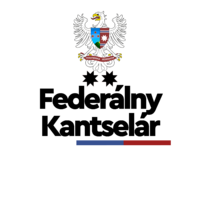Federal Chancellor of Yekateria
| Federal Chancellor of the Yekaterian Federation
Federálny Kantselar Yekaterskej Federácie | |
|---|---|
 Emblem of the Federal Chancellor | |
 Flag of Yekateria | |
|
Federal Council of the Yekaterian Federation | |
| Style |
Mr/Madame Chancellor (informal) The Honorable (formal) His Excellency (diplomatic) |
| Status | Head of Government |
| Member of |
Federal Council Federal Security Council Federal Economic Committee Federal Assembly (House of Federals) |
| Residence | Litoříča Chancellery Palace |
| Seat | Xanderholm, Federal Capital Territory, Yekaterian Federation |
| Nominator | Political party |
| Appointer | Federal President with confidence of the House of Federals |
| Term length |
Unlimited, 5 year terms (or as long as the Federal Assembly meets for its current term, barring the chancellor's resignation) |
| Constituting instrument | Federal Constitution of the Yekaterian Federation |
| Inaugural holder |
Peter Malenkov (as Chairman of the Council of Ministers) 11 July 2050 William Taylor (as Chancellor) 10 January 2345 |
| Formation |
11 July 2050 (as Chairman of the Council of Ministers/Premier) 10 January 2345 (current form) |
| Deputy | Federal Vice Chancellor of Yekateria |
| Salary | 25m Korunas annually |
| Website | fko.vla.yf |
The Federal Chancellor of Yekateria (full title: Federal Chancellor of the Yekaterian Federation; Yekaterian: Federálny Kantselar Yekaterskej Federácie) is the head of government of the Yekaterian Federation. A member of the Federal Council, the Federal Chancellor co-leads the Council in the form of a diarchy along with the Federal President, currently Karl-Alexander Rynsbürgen. The Federal Chancellor (along with the Federal President) are regarded as primus inter pares within the Federal Government, however holds significant influence in the nomination of cabinet secretaries and the shaping of policy agendas throughout the course of the term of a government. The chancellor also oversees the Federal Chancellery, which carries out the day-to-day running of Yekateria through the various federal executive departments. They are elected by the House of Federals, following nomination and vote by individual members, with no debate. The Federal Chancellor requires the confidence of the House of Federals, however they may only be removed through resignations and loss of confidence. However, all motions of confidence must be constructive; the outgoing chancellor will continue in a caretaker capacity until a positive majority is determined for a potential successor.
Historically, there has been no restriction on the candidate for federal chancellor, with officeholders such as William Taylor having been elected into the office prior to being elected as a federal deputy. Other former officeholders, for example, were nominated by the Federal President under Yekateria's former semi-presidential (president-parliamentary) system, either as technocratic or compromise candidates. Currently, Yekaterian chancellors have conventionally been federal deputies within the House of Federals, and a high-ranking member of their respective party. Based on recent elections of chancellors, they are usually nominated through a deliberative process by leaders of the prospective coalition's parties prior to a federal election, in which they will serve as the Chancellor-candidate of their party. In the event that any members of the prospective coalition gains a plurality (or is the largest member of a potential coalition with a potential majority), their Chancellor-candidate will be the first-in-running candidate for Federal Chancellor. Following their election as Federal Chancellor, their seat is retained, as they are considered primus inter pares and will still be able to participate in votes and introduce bills. However, as a member of the Executive Branch, they will not be able to participate in committees.
As of 2391, there have been 45 federal chancellors (14 chancellors and 31 premiers, the precursor position). The current incumbent Federal Chancellor is Social Democratic Party chancellor Mark Winters, who replaced Karl Freitag following the 2390 federal election.
Powers and duties
As the head of government, the chancellor is responsible for the day-to-day running of the government and the execution of policies, proposals, and programs. In contrast to the Federal President, who is largely responsible for safeguarding and running affairs of government and managing executive agencies, the Federal Chancellor works primarily with the Federal Vice Chancellors and cabinet secretaries in order to implement laws, conduct development programs, and ensure the stability of the country's day-to-day life. The Federal Chancellor is also able to issue legally binding Chancellorial Proclamations, nominate candidates for secretaries and deputy secretaries in the Federal Council, and collaborates with the Federal President on matters such as the appointment of diplomats and matters involving wars and other military matters. As a result of the Chancellor's reliance on confidence by the House of Federals, as well as their position as a member of the chamber, the Chancellor represents the direct link between the popularly elected Federal Assembly and the Federal Council.
The chancellor's position as a member of the House of Federals enables their work in further influencing the legislative process, working with the Federal Assembly leadership in guiding the process of implementing or rejecting bills. As the chancellor is usually a high-ranking member of their political party, they are involved in the nomination and selection process of committee leaders, floor leaders, and in a roundabout way, the Federal President. The chancellor also leads the party's coalition, together with the party leadership of the chancellor's allied parties. As such, the chancellor is expected to maintain a functional coalition government; this is maintained largely by allocating some cabinet portfolios to allied parties, as seen in the most recent cabinets (De Rynsburger-Lindeman II, Hochburger-Ernman, and Hochburger-Freitag I).
Qualifications and election
As the second-highest leader in the entire nation of Yekateria, the qualifications and election process for a chancellor involves consensus-building, the support of at least 50% of the House of Federals for the chancellor and vice chancellors, and the support of the Federal Senate for the appointment of cabinet secretaries. Nominally, the chancellor is expected to be a member of the House of Federals; however, in practice, this is not always the case. For instance, in the case of the eventual-first chancellor William Taylor, he was appointed and confirmed as the Premier in November 2343 despite not being a member of the House of Federals. Following concerns by parliamentarians on the status of an "outsider" running the government, however, Taylor ultimately stood for a by-election in the constituency of Zelenograd City, largely due to incumbent Valerian Korzhev offering to step aside temporarily. Following Taylor's election as president in 2346, however, he relinquished his seat back to Korzhev.
Besides such conventions, however, the qualifications for Federal Chancellor are in line with that of a typical House of Federals deputy, with the following eligibility qualifications set out in the Federal Constitution. These being;
- A citizen of Yekateria and its constituent republics and territories, either by jus soli (citizen at birth) or naturalisation, of which the citizen is expected to have lived in the Federation for at least five years or is a citizen of a polity that acceded to the Federation (such as is the case with former Chancellor Ryan Hochhahn)
- An individual who has reached the requisite age of 20 years;
- An individual without a conviction of treason or terrorism;
- An upstanding citizen who has not served a sentence in accordance with a criminal conviction within the past 5-10 years depending on the severity of the crime
- And an individual who holds respect for the system of democracy, the essential basis of human rights, and does not face personal bankruptcy.
Inauguration and oath
Following the successful election of a chancellor, the chancellor-elect usually meets with the outgoing chancellor prior to assuming office. As a byproduct of the nation's fairly directorial system of government, this is usually held informally and occasionally without significant press presence. In such meetings, the outgoing chancellor is expected to brief the incoming chancellor on outstanding affairs and policy matters; such meetings are customary in order to facilitate a smooth transition between one government to the next. The chancellor, depending on whether they are inaugurated on the same day as other leaders (such as the Federal President) or whether if they are inaugurated on a separate day, congregates at either the Skavštona Grand Palace or the Federal Chancellery Building. In the presence of spectators, the oath is administered by the President of the Federal Constitutional Forum, as follows;
I, (name), The Chancellor of the Yekaterian Federation, and the head of government for its 40 Republics, do swear that I will carry out the duties of the Office of the Federal Chancellor; to serve and protect the Federation from any threats, internal or external; faithfully and meaningfully, for as long as I am in the office of the Federal Chancellor.
As Yekateria is nominally an athiest state, the incoming Federal Chancellor is expected to omit any reference to a deity or higher power. This is followed due to the nation's highly non-religious population. With the initial inauguration of Ryan Hochhahn in 2366, Yekateria's first leader to belong to a religion in over 300 years, this initially brought up concerns about religious influence in government; however, Chancellor Hochhahn elected to stick to the norm. The new Chancellor is also expected to give an inaugural address, from which they are able to announce the themes and agenda of their government, of which their policy proposals will largely be based off of.
After the inauguration, the new Chancellor is given a welcoming ceremony by staffers of the Litoříča Chancellery Palace; they are given a detailed tour of the palace and are eventually ushered into their new office where they conduct a majority of the day-to-day running of the nation. A secondary office is reserved for their use in the Federal Chancellery Building, from which they are able to hold more public meetings. Following the necessary administrative duties, the chancellor is then able to complete the transition by bringing in personal effects and conduct a minor redecoration of their new office.
Term
The chancellor has no fixed length of office; however, based on precedent and the Article I, Section 3, Clause II of the Federal Constitution, a recommended term limit of three five-year legislative terms (for a total of 15 years). The chancellor may be removed from office if they are no longer able to maintain the confidence of the House of Federals, are impeached by the House, if they resign, or in the case of their death. Historically, premiers, the precursor to chancellors, were also expected to resign following their accession to the position of president; this situation is much rarer today due to the presence of several Federal Vice Presidents.
As half of the House of Federals is elected every five years (in years ending with 0, 3, 5, and 8), the potential for a change in the chancellorship every 2.5 years is possible, although this is uncommon thanks to the ubiquity of coalitions and the remote possibility of a coalition losing a large number of seats within a short period of time. In spite of this, however, the Chancellor is also able to request a total dissolution of the House of Federals at any time (except for within a year before a midterm or general election) in the form of extra elections (Yekaterian: extra voľby) following a failed constructive vote of no confidence. If this is not possible, however, the Chancellor is able to appoint a successor or continue in a caretaker capacity until a midterm or general election.
Vacancy and succession
In the event that the chancellor dies, resigns without continuing as caretaker until a vote on a successor is held, is incapacitated, or is impeached, the first deputy vice chancellor assumes the position of acting chancellor until a successor is elected or the chancellor is able to competently fulfill their duties. In the case of death, the acting chancellor holds the position until a new chancellor is elected in; and may be voted in as the new chancellor if approved by the House of Federals. In the event that the first deputy is unable to fulfill the role, the responsibility will instead be held by the next vice chancellor; creating a line of succession that extends down from the vice chancellors to the secretaries, beginning with the Federal Secretary of State and ending with the nominally last secretary in the council, the Federal Secretary of Social Support Services.
Style and benefits of office
The chancellor enjoys an annual salary of 25,000,000 Korunas, a 100,000,000 Koruna yearly general expenses account, and a 500,000 Koruna miscellaneous spending account. In addition, the chancellor is also provided a primary residence at the Litoříča Palace in Xanderholm, with a secondary residence at the July Hill Palace in Nataliska, available for use at their own pleasure. Official affairs of state are funded by the Federal Government, however non-official events are to be paid for personally by the Chancellor.
| Styles of the Federal Chancellor of the Yekaterian Federation | |
|---|---|
 | |
| Reference style | His/Her/Their Excellency |
| Spoken style | Your Excellency |
| Alternative style | Mr/Madame Chancellor |
Additionally, the chancellor is also granted unrestricted access to several government-owned residences and retreats throughout the Federation: a notable example being the Mezhyrska Lodge in Vyshgorod, Xandersko and the Atlantický Bydlisko located in an undisclosed location in Aquitaine.
The chancellor is provided a range of cars for use as the official state car, largely limousines custom-built from Yekaterian companies such as Verona, Carpathia, and Novegora as land vehicles. As for other forms of transport, the custom model Fedaero NCe 238 serves as the official aerial transport over atmospheric territory. Meanwhile, the official spacecraft of choice is the Kosmona VC-606X for use in interplanetary and intergalactic travel, as well as the Federal Yacht Novy Polarska for sea travel. The chancellor's various forms of transportation enables them to reach all four corners of the intergalactic federation within a matter of days.
As for security, the chancellor, their family, and guests receive continuous personal protection from the Federal Security Service (Federálochsluž), a government-funded security service for important state leaders. The protection lasts for as long as they are chancellor + 25 years following their exit from the office, however they may request for their protection to be lifted or extended after 10 years of post-chancellorship protection. This provides them with the opportunity to seek further lower offices after completing a stint as chancellor; however their protection is essential especially due to the hyperpartisan nature of Yekaterian politics.
The chancellor is officially styled with the title His/Her/Their Excellency and holds the second-highest rank within the Federal Government hierarchy, behind the Federal President. After leaving office, the style is still used when referring to the now-former chancellor, however the style is then His/Her/Their Excellency the Former Chancellor.
List of premiers and chancellors of Yekateria
| No. | Portrait | Name (Birth-Death) |
Party | Term of office | Elections won | Cabinet | President | |||
|---|---|---|---|---|---|---|---|---|---|---|
1
|
11
July 2050 |
11
July 2070 |
20 years
|
2050
2055 2060 2065 2067 (party election) |
Peter Malenkov I-V
|
|||||
2
|
11
July 2070 |
11
July 2077 |
7 years
|
2070
2075 |
Lebedev I & II
| |||||
3
|
11
July 2077 |
23
December 2082 |
5 years, 166 days
|
2080
|
Ulyanilov I & II
| |||||
4
|
10
January 2083 |
10
January 2090 |
7 years
|
2085
|
Andrey Malenkov I & II
|
|||||
5
|
10
January 2090 |
24
November 2095 (resigned) |
5 years, 319 days
|
2090
2095 |
Zarynov I & II
|
|||||
6
|
24
November 2095 |
4
July 2098 (deposed) |
2 years, 223 days
|
-
(elected following Zarynov's resignation) |
Koronov
|
|||||
7
|
4
July 2098 |
7
January 2106 (died in office) |
7 years, 186 days
|
2100
|
Andrey Malenkov III & IV
|
|||||
8
|
7
January 2106 |
10
January 2108 |
2 years, 3 days
|
-
(elected to succeed Andrey Malenkov) |
Valentina Malenkova
|
|||||
9
|
10
January 2108 |
10
January 2133 |
25 years
|
-
(party election) 2110 2115 2120 2125 2130 |
Ivan Malenkov
I II III IV V VI |
|||||
10
|
10
January 2133 |
13
June 2143 |
10 years, 156 days
|
-
(elected to succeed Ivan Malenkov) 2135 2140 |
Stepan Malenkov
I II III |
|||||
11
|
13
June 2143 |
10
January 2150 |
6 years, 211 days
|
-
(elected to succeed Stepan Malenkov) 2145 |
Alilluyeva-Malenkova
I II | |||||
12
|
10
January 2150 |
10
January 2155 |
5 years
|
2150
|
Vasily Malenkov
|
|||||
13
|
10
January 2155 |
10
January 2166 |
11 years
|
2155
2160 2165 |
Julia Malenkova
I II III |
|||||
14
|
10
January 2166 |
10
January 2171 |
5 years
|
-
(party election) |
Kremlyna
I |
|||||
15
|
10
January 2171 |
10
January 2174 |
3 years
|
-
(party election) |
Julia Malenkova IV
|
|||||
16
|
10
January 2174 |
10
January 2204 |
30 years
|
-
(party election) 2175 2180 2185 2190 2195 2200 |
Erik Malenkov
I II III IV V VI |
|||||
17
|
10
January 2204 |
4
January 2206 (assassinated) |
1 year, 359 days
|
-
(party election) 2205 |
Aleksandr Malenkov
I II |
|||||
18
|
10
January 2206 |
10
January 2215 |
9 years, 6 days
|
-
(party election) 2210 |
Natalia Malenkova
I II |
|||||
19
|
10
January 2215 |
10
January 2252 |
37 years
|
2215
2220 2225 2230 2235 2240 2245 2250 |
Shelebkova
I II III IV V VI VII VIII | |||||
20
|
10
January 2252 |
10
January 2255 |
3 years
|
-
(Parliamentary vote) |
Alinenko
| |||||
21
|
10
January 2255 |
30
September 2259 (resigned) |
4 years, 252 days
|
2255
|
Bukharova
| |||||
22
|
1
October 2259 |
10
August 2260 (resigned) |
315 days
|
2260
|
Kravchenko
I II |
|||||
23
|
10
August 2260 |
10
January 2268 |
8 years, 252 days
|
-
(Party election) 2265 |
Gromykina
I II | |||||
24
|
10
January 2268 |
10
January 2280 |
12 years
|
2260
|
Kravchenko
III IV |
|||||
25
|
10
January 2280 |
4
April 2295 |
15 years, 86 days
|
2280
2285 2290 2295 |
Natalia Malenkova
III IV V |
|||||
-
|
4
April 2295 |
11
July 2295 |
99 days
|
-
(Party election) |
Myshchenko (Caretaker)
|
|||||
26
|
11
July 2295 |
12
July 2295 |
1 day
|
-
(Party election) |
Elise Malenkova
(Caretaker) |
|||||
27
|
12
July 2295 |
10
January 2297 |
1 year, 182 days
|
-
(Party election) |
Eline Malenkova
I | |||||
28
|
10
January 2297 |
5
August 2300 |
3 years, 209 days
|
2297
2300 |
Khysakova
I II |
|||||
29
|
5
August 2300 |
10
January 2320 |
19 years, 163 days
|
-
(Coup) 2305 2310 2315 |
Eline Malenkova
II III IV V |
|||||
30
|
10
January 2320 |
13
April 2330 |
10 years, 95 days
|
2320
2325 2330 |
Petrauskas
I II III | |||||
31
|
13
April 2330 |
19
November 2343 |
13 years, 220 days
|
-
(Parliamentary vote) 2335 2340 |
Tyshenkova
I II III | |||||
32
|
19
November 2343 |
10
January 2346 |
2 years, 53 days
|
-
(Parliamentary vote) 2345 |
||||||
33
|
10
January 2346 |
16
May 2356 |
10 years, 128 days
|
-
(Parliamentary vote) 2350 2355 |
||||||
34
|
16
May 2356 |
7
July 2356 |
53 days
|
-
(Parliamentary vote) |
De Rynsburger-Malenkova
| |||||
35
|
7
July 2356 |
10
January 2366 |
9 years, 184 days
|
Jul. 2356
Oct. 2356 2360 |
||||||
36
|
10
January 2366 |
18
September 2370 |
4 years, 252 days
|
2365
|
||||||
37
|
18
September 2370 |
10
October 2370 |
23 days
|
-
(Parliamentary vote) |
De Rynsburger-Malenkova
| |||||
38
|
10
October 2370 |
10
January 2371 |
93 days
|
-
(Parliamentary vote) |
||||||
39
|
10
January 2371 |
7
May 2376 |
5 years, 119 days
|
2370
2375 |
||||||
40
|
7
May 2376 |
10
January 2381 |
4 years, 247 days
|
May 2376
(Parliamentary vote) 2378 Midterms |
||||||
41
|
10
January 2381 |
25
September 2381 |
259 days
|
|||||||
42
|
25
September 2381 |
10
March 2384 |
2 years, 167 days
|
|||||||
43
|
10
March 2384 |
10
January 2386 |
1 year, 306 days
|
|||||||
44
|
10
January 2386 |
10
January 2391 |
5 years
|
|||||||
45
|
10
January 2391 |
Incumbent
|
Ongoing
|
|||||||
Incumbent cabinet
The current cabinet is the Rynsbürgen-Winters cabinet, with its chancellery representative being Chancellor Mark Winters. The cabinet has been in government since 10 January 2391, and consists of five vice-chancellors.
| Federal Chancellery | ||||||
|---|---|---|---|---|---|---|
| Office | Portrait | Officeholder | Party | Took office | Left office | |
10 January 2391
|
Incumbent
| |||||
10 January 2386
|
Incumbent
| |||||
10 January 2391
|
Incumbent
| |||||
10 January 2391
|
Incumbent
| |||||
10 January 2391
|
Incumbent
| |||||
10 January 2381
|
Incumbent
| |||||
Post-chancellorship
Following their exit from office, all former chancellors are entitled to pensions, office space, as well as security protections. To this end, former chancellors are paid an annual pension of 430,000 Korunas, are entitled to subsidised health coverage and travelling expenses. Former chancellors with substantial political legacies and influence may also collaborate with federal institutions in order to establish chancerial libraries or provide for their papers and documents from their time in office to be displayed as part of the Federal Archives. As of 2381, former premiers/chancellors may also be offered advisory positions within the Federal Government itself, such as in the Federal Advisory Council and the Federal Constitutional Forum.
Several chancellors have also gone on to seek further office following their chancellorship: for example, Thomas-Anton Lindeman unsuccessfully sought the Federal Presidency in the 2380 presidential elections, and was later appointed as the Attorney-General under the Hochburger-Ernman cabinet. Other former chancellors, meanwhile, have successfully gone on to higher office, for instance William Taylor who was elected president in 2346, and Philip-Alexander de Rynsburger who successfully sought another stint as Federal President after serving as Chancellor for almost 2 decades, becoming the Federal President from 2366 to 2381. Despite the nominal term limit of three consecutive five-year terms, no chancellor in recent history has reached the limit thus far; allowing them the ability to run for chancellor once again, as was the case with Ryan Hochhahn and Natalia Malenkova.
In the event that a former premier/chancellor becomes deceased, the family of the deceased is given the option and opportunity to have a state funeral held in their honour, being seen as a final farewell for the deceased chancellor and as an opportunity to allow for reflection on the life of the deceased chancellor, particularly their time in office. The funeral obligations are jointly shared between the Federal Assembly and the Federal Government, with current leaders and still-living former leaders and their families being invited to attend the ceremony. The most recent state funeral held for a former premier/chancellor was that of Julia Malenkova (2384) who died of advanced age at 255 years old.

















































































